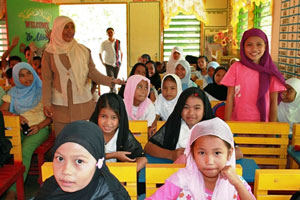Building resilient communities, with the capacity, skills and internal strength to cope with and recover from adversity, is crucial to peacebuilding and statebuilding.
Education helps to normalize social relations in post-conflict environments, and has a profound and enduring effect on peacebulding. Education is central to long-term reconciliation and nationbuilding, and it can address the disaffection and alienation experienced by entire generations after conflict. AusAID's support for education services in Mindanao, in the Philippines, is a good example of how education can provide a path to durable peace.
While the Philippines is not considered a fragile state (by either the OECD DAC or the World Bank), human development indicators in conflict-affected regions of Mindanao are worse than in some of the poorest countries in Sub-Saharan Africa.
More than half Australia's development assistance to the Philippines is directed to Mindanao, home to most of the country's indigenous and Muslim populations. Decades of conflict and instability have limited the capacity of the Philippines Government to provide reliable education services in Mindanao. School participation rates amongst indigenous and Muslim populations in Mindanao are very low – limiting future job opportunities and contributing to the alienation of these populations from mainstream society.
Australia's approach to education supports partner governments' efforts to lift people out of poverty by helping to strengthen systems, policies and institutions. The Australia-Philippines Development Strategy helps to improve basic education for Filipino children in partnership with the Philippines Government. The Basic Education Assistance for Mindanao in the Autonomous Region in Muslim Mindanao (BEAM-ARMM) Program assists the Philippines Government to improve delivery of basic education in ARMM, the poorest and lowest performing region in the country. It will enable about 40,000 children to access pre-school and elementary school and provide pre-school classes in around 1,300 remote Muslim communities. Australia will also establish six centres to produce learning materials and provide health programs in 300 schools. The program runs for six years (2011-2017).
AusAID supports education systems that promote tolerance, are accessible, and reduce cultural isolation, all of which are important elements of peacebuilding. Australia and the Philippines recently launched the Philippines' Response to Indigenous Peoples and Muslim Education (PRIME) Program that will help more Filipino indigenous and Muslim school children have better access to a good quality education. Australia is PRIME's inaugural donor with funding of $20 million from 2011-14. With help from the PRIME Program, the Philippine Department of Education will develop the basic education curriculum and train teachers to make teaching and learning culturally sensitive and relevant to indigenous and Muslim school children.
The overarching objective of our education programs in Mindanao is to improve the long-term peace and stability of conflict-affected areas. Australia's approach to education in conflict-affected environments aims to foster values and attitudes that address exclusion, alienation and social tensions.

